PTFE(Teflon) CNC Machining
PTFE(Teflon), or Polytetrafluoroethylene, is a synthetic fluoropolymer known for exceptional heat, chemical, and corrosion resistance.
CNC machining can produce precise, complex PTFE parts by utilizing the material’s moldability before curing and machinability after. Machined PTFE parts work well in seals, bushings, and harsh environments needing slippery surfaces.
- Certified Materials
- Factory Price
- No Minimum Order
- Fast Turnaround
Save 30% cost on average!

About PTFE-Teflon for CNC Machining
Teflon, or PTFE, is a special plastic made from carbon and fluorine. It’s excellent at handling heat and doesn’t rust easily. It’s soft, so it’s easy to shape with CNC machining, but ensuring accuracy can be challenging.
Teflon is different from other plastics because it melts at a very high temperature, has low friction, and doesn’t react with many chemicals. These features make it perfect for non-stick pans and use in food, oil, medical, and electronic industries. It’s ideal for harsh conditions requiring smooth, non-reactive surfaces.
| Generic PTFE (Polytetrafluoroethylene) at a Glance | |
|---|---|
| Application | PTFE is used in non-stick cookware, electrical insulation, gaskets, seals, aerospace components, medical devices, and chemical-resistant tubing due to its unique properties. |
| Advantages | PTFE boasts chemical inertness, low friction, high-temperature resistance, electrical insulation, non-stick properties, and corrosion resistance, making it versatile in various applications. |
| Disadvantages | PTFE is relatively soft, challenging to machine precisely, expensive, not easily recyclable, and can degrade when exposed to certain high-energy radiations. |
| Lead Time | Lead time typically starts at 7 days but can extend due to availability or international manufacturing. |
| Price | PTFE is pricier than many other plastics due to its unique properties and manufacturing processes. |
| Tolerances | Machining tolerances of 0.005” (0.01 mm) are achievable. |
| Wall Thickness | Wall thickness can reach 0.03” (0.8 mm), but it may vary based on the wall-to-planar dimension ratio. |
| Max Part Size | The part's maximum size depends on the available machines and the intricacy of the design. |
Most common grade of PTFE
The diverse grades of PTFE materials possess distinct properties due to varied additives, making them apt for specific application needs.
This is pure PTFE without any additives. It has the best electrical and chemical resistance properties and is often used in electrical insulation, seals, and gaskets.
Mechanical grade PTFE is a high purity, virgin polymorph PTFE ideal for mechanical parts needing excellent chemical resistance and a low friction coefficient. It machines well and can be used for seals, valves, bushings, and bearings requiring strength, creep resistance, and dimensional stability.
Glass-filled PTFE is a composite material made by reinforcing PTFE with fine glass fiber for increased strength and rigidity. It retains the corrosion resistance of PTFE while improving wear resistance, dimensional stability, and load-bearing capabilities. Ideal for mechanical parts needing higher mechanical strength.
Carbon-filled PTFE is a composite created by adding carbon filler to PTFE resin to boost conductivity and wear resistance. It maintains PTFE’s friction and chemical resistance properties while increasing hardness and load capacity. Used for parts requiring conductivity and durability like bushings, seals, and valve seats.
Bronze-filled PTFE is a PTFE composite reinforced with bronze particles to improve strength, wear resistance, and bearing properties. Retains PTFE’s corrosion resistance and low friction while enhancing mechanical performance. Used for bearings, bushings, thrust washers, and other dry running applications.
Graphite-filled PTFE is a composite created by adding graphite filler to PTFE to boost thermal conductivity and reduce friction. It retains the chemical resistance of PTFE while improving wear properties, lubricity, and heat dissipation. Used for bushings, bearings, valve seats, and other parts needing heat conductivity.
PTFE Mechanical Properties Chart
Understanding PTFE’s mechanical properties aids in project material selection.
| Tensile Strength, Ultimate | Tensile Strength, Yield | Elongation at Break | Modulus of Elasticity | Flexural Modulus | Compressive Yield Strength | Hardness, Shore D | Izod Impact, Notched | |
|---|---|---|---|---|---|---|---|---|
| PTFE | 13.0 - 55.0 MPa | 20.0 - 196 MPa | 70.0 - 600 % | 0.390 - 0.750 GPa | 0.275 - 0.700 GPa | 2.00 - 24.1 MPa | 50.0 - 67.0 | 1.87 - 1.89 J/cm |
Note: The provided numbers are approximate and in metric units. Properties can differ based on manufacturer, grade, and application. Always consult the supplier for precise and up-to-date data.
PTFE CNC machining is a computer-controlled process used to shape Polytetrafluoroethylene (PTFE), a soft, chemically resistant thermoplastic. CNC, or Computer Numerical Control, ensures precision in crafting intricate parts from PTFE. Given PTFE’s unique properties, like high heat resistance and non-reactivity, CNC machining is vital for producing components for industries like medical, aerospace, and food processing, where precision and material integrity are paramount.
Contact AT-Machining for expert CNC machining of PTFE and other thermoplastics. Our skilled engineers and machinists will tailor high-quality components to your specifications.
Benefit of PTFE CNC machining
There are several benefits to CNC machining Polytetrafluoroethylene(PTFE):
Precision and Accuracy
CNC machining ensures that PTFE components are crafted to exact specifications, guaranteeing the reliability and fit of the final product.
Consistency
With CNC machining, every PTFE part produced is consistent, ensuring that customers receive uniform quality across batches, reducing potential issues in assembly or application.
Efficiency
Automated CNC processes lead to faster production rates, allowing customers to receive their orders in shorter lead times, which can be crucial for time-sensitive projects.
Customization
The flexibility of CNC machining means customers can request custom designs or modifications, ensuring the final product meets their specific needs.
Reliability
CAD/CAM integration with CNC machines streamlines design-to-production, minimizing errors and ensuring products align with customer design specifications.
Cost-Effectiveness
Reduced waste and labor costs in CNC machining can translate to competitive pricing, offering customers value for their money.

Optimize Design
Opt for simpler designs when possible. Complex geometries or intricate features can increase machining time and costs. By simplifying or consolidating parts, customers can reduce the number of operations required.

Bulk Ordering
Ordering in larger quantities can lead to economies of scale. Manufacturers often offer discounts for bulk orders as setup costs are distributed over more parts, reducing the cost per unit.

Material Selection
While PTFE has specific advantages, if the application allows, consider using alternative, less expensive materials or grades of PTFE that still meet the project's requirements.

Supplier Selection
Choosing a seasoned CNC machining firm like AT-Machining ensures cost-effective PTFE part production. Their expertise in materials, design, and machining can significantly cut costs.
Gallery of CNC machined PTFE parts
Our manufacturing capabilities serve diverse industries, including medical, aerospace, and marine robotics. We take on projects of any size and offer exceptional service to all customers
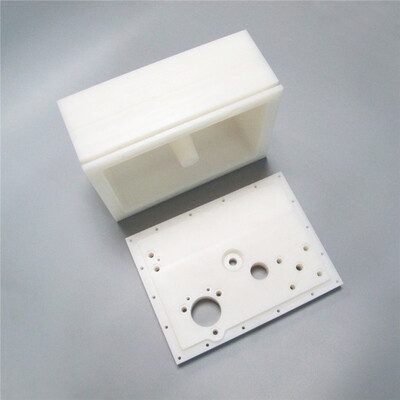
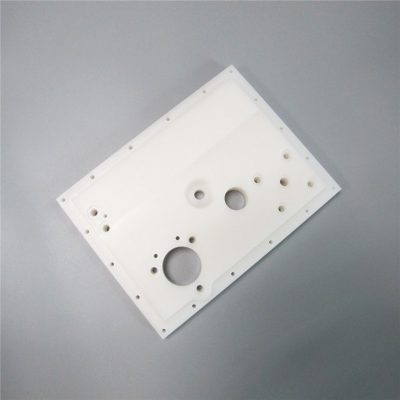
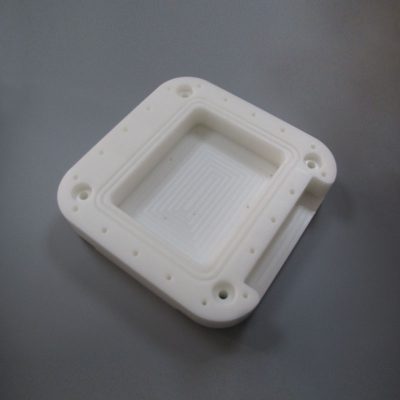
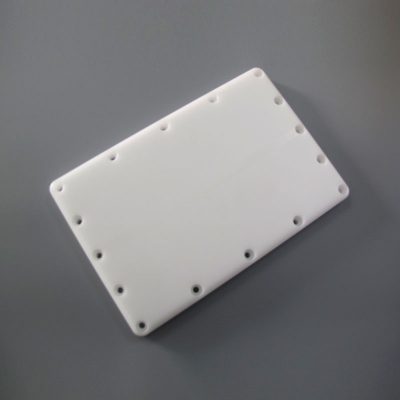
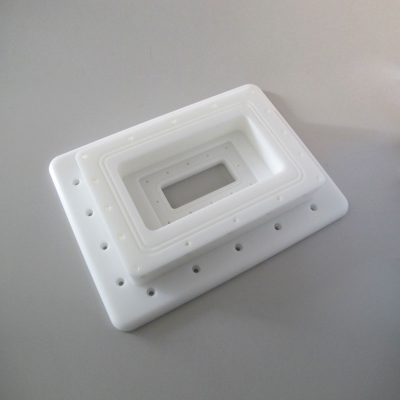
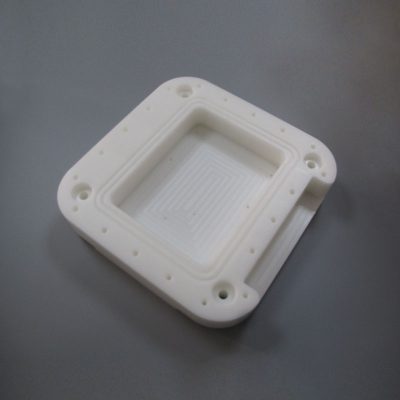
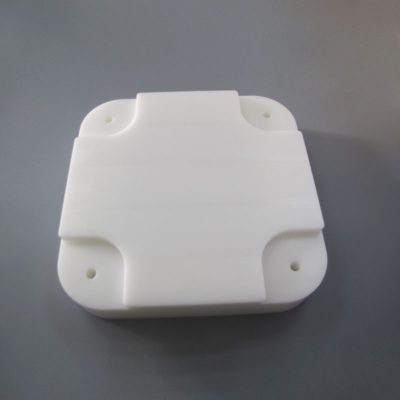
We are here to solve your problem and delivery your needs
CNC Machining PTFE FAQs
PTFE’s softness can make precision machining tricky, and its unique properties might require specialized tools or techniques.
Yes, PTFE is commonly used in non-stick cookware due to its non-reactive nature and ability to endure high temperatures without breaking down.
PTFE’s unique properties, like its high melting point and chemical resistance, set it apart from other plastics, making its CNC machining process specialized.
While PTFE is not as easily recyclable as some other plastics, offcuts and waste from the CNC machining process can often be reused or repurposed.
Industries such as medical, aerospace, electronics, food and beverage, and petrochemicals frequently utilize PTFE CNC machined components due to their specialized properties.
